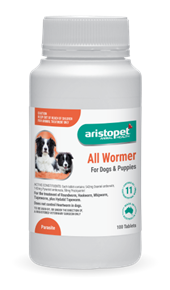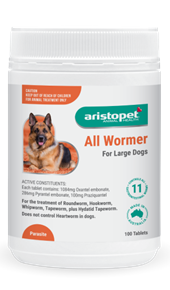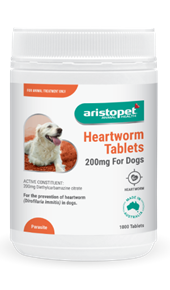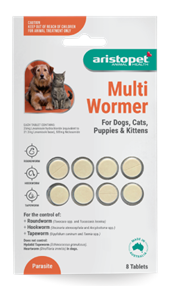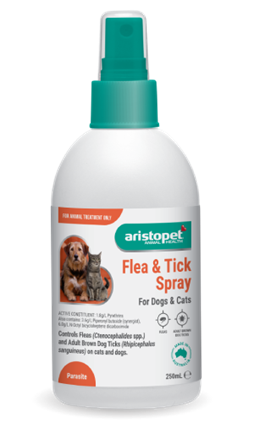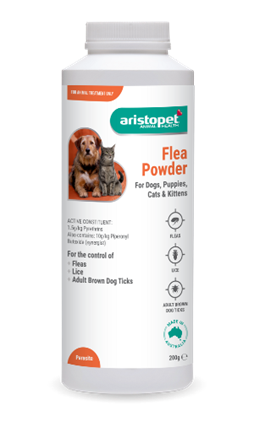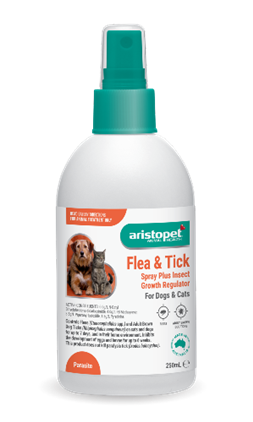Symptoms of worms in dogs
Worms can quickly make your dog miserable — they come with a lot of unpleasant symptoms including an upset, swollen and sore tummy, lethargy and many more. With this in mind, it’s important to keep an eye out for these key symptoms and treat your dog as soon as possible:
Pot-bellied appearance — If your dog has a large number of worms, your dog can get an upset stomach and an excess of fluid This can cause their stomach to swell and have a “pot-bellied” appearance.
Vomiting and diarrhea — If your dog has worms in its tummy, they’re bound to feel unwell. Worms can cause your dog to feel sick and vomit, or even have diarrhea due to intestinal wall inflammation. This can also make dogs feel lethargic and lose weight as a result, even if they’re eating as normal.
Chronic coughing — In the early stages of heartworms, you might notice your dog coughing after exercise. This suggests that the heartworm parasites are migrating into your dog’s lungs, causing inflammation and increased pressure.
Dull coat and/or hair loss — Worms can make your dog’s fur look dull and dried out due to a deficiency. Your dog might also lose some fur, especially around its bottom… see the point below.
Dragging bottom across the ground — You might think that their bottom is just itchy but if your dog is dragging its bottom across the grass, it could be a sign that your dog's anal gland is clogged or it could be a worm infestation.
Presence of roundworms in the feces — You might be able to see worms in your dog’s feces. Worms look like little grains of rice or spaghetti and might even get stuck in your dog’s fur.
If your dog is displaying any of these symptoms, your dog needs a worming treatment and quite possibly a trip to the vet. Leaving worms untreated can be very dangerous for your dog.
Our worm treatments for dogs
At Aristopet, we have dog worming tablets and spot-on treatments for the smallest of pups to the biggest of boys. From under four kilograms to over 25 kilograms, you can rest assured knowing your unique dog is protected against parasites like heartworms and intestinal worms.
- Spot-on worming treatments — Our spot-on treatments are real value for money. By controlling and preventing fleas, heartworm, intestinal worms, sarcoptic mange and ear mites, you can treat your dog for all parasites in one go. Just massage the liquid into the skin and fur between your dog’s shoulder blades and your dog will be protected for up to one month.
- Dog worming tablets — For an all-in-one worming treatment, we recommend our dog worming tablets. Our all-wormer treats all 11 gastrointestinal worms including roundworm, hookworm, whipworm, tapeworm and hydatid tapeworm. Paired with our heartworm tablets, your puppy will be safe from parasites for at least one month.
Keep your pup protected from parasites — find Aristopet worm treatments for dogs in pet stores like PETstock, Petcircle, Petbarn and My Pet Warehouse today!
FAQs about worms and worm treatments for dogs
Can I treat my dog for worms without going to the vet?
While you can control and protect your dog from worms, if you suspect they actually have worms and they’re displaying worrying symptoms, you need to take your dog straight to the vet. If worms are left untreated, the worms can damage your dog’s internal organs and put their life at risk.
Where do dogs get worms?
Dogs can pick up worms from a wide range of sources — some puppies can get worms from their mother’s milk, some dogs can get worms from eating dead animals or prey outside, from having fleas with worm larvae and even from being exposed to other dogs’ mess.
Are worms contagious?
Yes, intestinal worms are contagious to other animals and humans. Generally speaking, worms are passed in your dog’s feces — the infective larvae can inhabit the soil around your dog’s mess, leaving other dogs and children at risk of accidentally touching the contaminated soil (even if the mess has been picked up).
What do worms look like?
If your dog has worms, you might notice what looks like grains of rice or spaghetti in your dog’s feces. This means your dog needs a deworming treatment and a trip to the vet if your dog seems unwell, lethargic or uncomfortable. This could be a symptom of a more serious problem.
Do I need to worm my dog if they don’t have worms?
Yes! You should treat your adult dog for worms every three months to ensure they are protected against worms and to treat worms that may not have caused any symptoms yet. Deworming a dog without worms will not cause any harm.
Find dog worming tablets and spot-on treatments in-store! Our products are stocked in pet stores across Australia.


